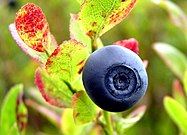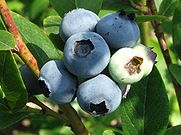
Back Bessie Afrikaans توت (ثمرة) Arabic بيرى (فواكه) ARZ Giləmeyvə bitkilər Azerbaijani Ouga BAT-SMG Ягада Byelorussian Ягада BE-X-OLD বেরি Bengali/Bangla Hugenn (frouezhenn) Breton Fruita del bosc Catalan
A berry is a small, pulpy, and often edible fruit. Typically, berries are juicy, rounded, brightly colored, sweet, sour or tart, and do not have a stone or pit, although many pips or seeds may be present.[1] Common examples of berries in the culinary sense are strawberries, raspberries, blueberries, blackberries, white currants, blackcurrants, and redcurrants.[2] In Britain, soft fruit is a horticultural term for such fruits.[3][4][5]
The common usage of the term "berry" is different from the scientific or botanical definition of a berry, which refers to a fruit produced from the ovary of a single flower where the outer layer of the ovary wall develops into an edible fleshy portion (pericarp). The botanical definition includes many fruits that are not commonly known or referred to as berries, such as grapes, tomatoes, cucumbers, eggplants, bananas, and chili peppers. Fruits commonly considered berries but excluded by the botanical definition include strawberries, raspberries, and blackberries, which are aggregate fruits, and mulberries, which are multiple fruits. Watermelons and pumpkins are giant berries that fall into the category "pepos". A plant bearing berries is said to be bacciferous or baccate.
Berries are eaten worldwide and often used in jams, preserves, cakes, or pies. Some berries are commercially important. The berry industry varies from country to country as do types of berries cultivated or growing in the wild. Some berries such as raspberries and strawberries have been bred for hundreds of years and are distinct from their wild counterparts, while other berries, such as lingonberries and cloudberries, grow almost exclusively in the wild.
While many berries are edible, some are poisonous to humans, such as deadly nightshade and pokeweed. Others, such as the white mulberry, red mulberry,[6] and elderberry,[7] are poisonous when unripe, but are edible when ripe.
- ^ Cite error: The named reference
Encyclopædia Britannicawas invoked but never defined (see the help page). - ^ "Berry". Merriam-Webster.
- ^ "soft fruit". Collins English Dictionary – Complete & Unabridged 10th Edition. HarperCollins. Retrieved 11 August 2015.
- ^ "Soft Fruit List: 2014–15". Royal Horticultural Society. Archived from the original on 11 August 2015. Retrieved 11 August 2015.
- ^ "Berry". The Free Dictionary. Retrieved 10 August 2015.
- ^ "White mulberry – Morus alba". Ohio Perennial and Biennial Weed Guide. The Ohio State University. Archived from the original on 12 April 2012. Retrieved 20 October 2012.
- ^ "Elderberry (Sambucus Species)". The Poison Plant Patch. Nova Scotia Museum. Archived from the original on 6 November 2014. Retrieved 13 August 2015.







